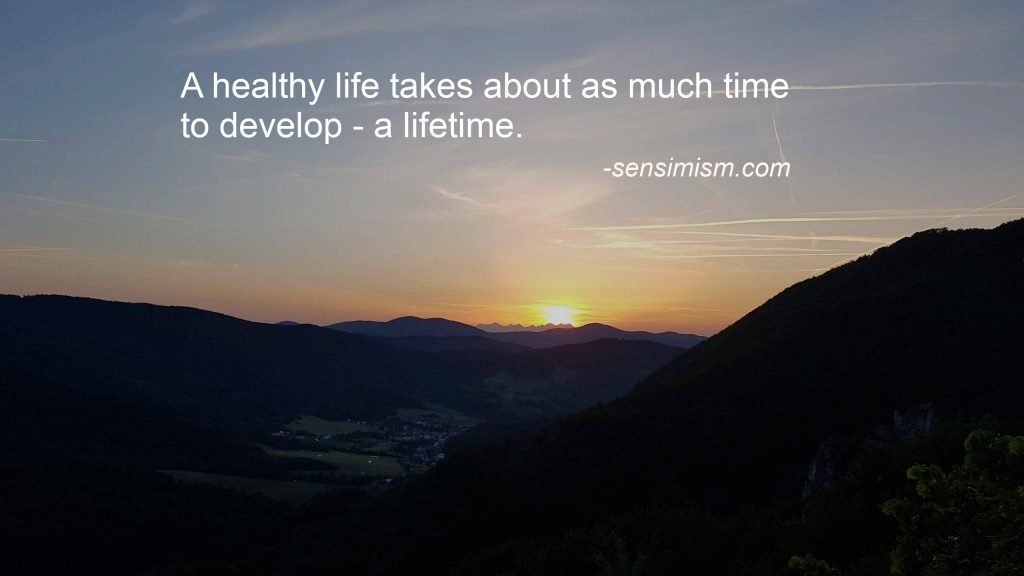Introduction to Sensimism
Sensimism – gradual, consistent and purposeful small steps towards improvement (a goal).
Sensimism was born out of learning about and practising stoicism, empiricism and a lighter form of scepticism in my life. It’s a combination of some of the best aspects of these philosophies or views, with added learnings from many great books, that help me cope with all the stuff life and our own biases, or genetic traits throw our way. And it’s far from a finished idea. It’s a seed. You help me plant it and water it. It might grow into a massive tree, a big plant or a flower. Or not. Doesn’t matter really. The sole act of writing and thinking about sensimism and how to apply it in life is a very fulfilling exercise. And who knows, it might even help a few more people.
Sensimism’s main aim is a more balanced life – to make living in today’s hectic world a bit more enjoyable, manageable. To give us tools and ideas on how to slow down and stop chasing after something.
Target areas of sensimism
Its main goal is the same as the one of stoicism: to live a good life. It’s adding additional layers of ways of dealing with things on top of stoicism, heavily leaning against what we see in nature. Specifically, nature’s slow but very steady and unstoppable progress, regardless of obstacles. The key idea therefore is that you achieve more by taking small steps consistently than trying to make big jumps. And it focuses more specifically on things in our lives we tend to value a lot and spend most of our time chasing:
Key principles of sensimism
- Anything worthwhile takes time
- Frequency over intensity
- Nothing is worth stressing about
- Controlled physical stress is good for you
- 80/20 – Pareto rule alleviates pressure
What does ‘good life’ mean in this context?
It’s a fulfilling life, where you feel happy to enjoy the good things, without focusing too much on the struggles. Being happy with your successes and/or failures, without focusing too much on just the failures and misfortunes. Seeing these misfortunes as stepping stones towards a better, wiser you, but also as an inevitable part of life. At the same time, not seeing success as the main thing to strive for in life, but merely as only one of the many enjoyable things in life. And realising, that all these things take time – same as anything significant in nature, “growing” a good life takes time.
Now read that back and replace success with anything you or others strive for – money, fame, pleasure, knowledge, legacy.
Good life from sensimisms’ perspective is about being happy with how you manage your life, whatever it brings, good or bad.
Even learning to live with bad decisions, not beating yourself about it. But at the same time, being accountable. Owning up to the damage you cause, in the same way, as owning up to all the praise you might receive.
But hey, so far, we’re nicely in the stoic territory – I’m not writing anything new here. Let’s add our sensimism, shall we?
- Sensim [Latin]: slow, gradual change.
- Sensimism: a philosophy aimed at achieving your goals through slow, but sustained, gradual effort towards a goal.
- A big chunk of it is based on how things are done in the longest-standing and most successful project there is: nature.
Natura non facit saltum
“Nature doesn’t make big jumps”
Imagine how things are done in nature. Does it change drastically over a human lifetime? Does it make any big leaps in the lifetime of a plant? A great analogy is a soft and vulnerable seed growing through tarmac into a plant. It’s not tough, it doesn’t have acid to burn through the tarmac, nor does it have the brute force or strength. What does it have?
It has sensimism: a slow but gradual and sustained effort towards a goal. It applies the tiniest of pressure so slowly, gradually but persistently – that it pushes the rough tarmac out of the way with its soft leaves, micrometre by micrometre.

That’s how you succeed at most things. That’s how sensimism sees success and the path to it. Not as a result of a lot of effort over a short period of time (that exhausts you, burns you out and more often than not leads to failure). Not as a yo-yo diet, where you push yourself to the limit, just so your lizard brain and exhaustion bring you back where you started. Sensimism sees success as a seed growing through tarmac – you get there through slow, gradual but persistent effort. Change your habits a bit, so that they become your new normal – and you will get there without much effort or risk of burning out. Just remember that real change, real success takes effort, consistency and time.
The question isn’t:
Can I do this?
but
Can I live like this for years from now on?
Being able to do something for a month is nice – but it won’t lead to lasting change unless you can keep doing it for years. Would any Instagram fitness celebrity be there without doing it for years? Could he/she to keep her followers if she stopped exercising after a few months and became chubbier (a sedentary, office lifestyle kinda layer of fat…)?
Would any entrepreneur be successful if she just tried very hard for a month or a year, then gave up?
Could any movement achieve any big goal, if they tried really hard for a few months, then stopped and called it a day?
Sensimism and relationships, love & sex
Working on your relationship every day a little bit will make it longer lasting and durable, than trying to find happiness by chasing a newer, shinier object. All relationships require work, maintenance and lose their sexiness over time. At least to some extent. If you are not happy in your current one, but this unhappiness isn’t caused by your partner not being a good partner, but by your doubts (grass is greener on the other side syndrome), then be sensible – work on it. It will reward you in the long term. Even if the short term feels like a heavy burden.
Chasing after the ultimate relationship will likely end up in the same situation – some other grass will seem greener again.
Sensimism and fitness & health

Doing a bit of exercise daily (and throughout the day) is better than not doing much all week, then destroying yourself during a 2hr cross-fit session.
Changing your diet gradually, to something that is healthier, but you also enjoy it, so it becomes your new normal, will get you the result you want: better shape that will stick for a lifetime, as opposed to getting ripped over 3 months, so that you can yo-yo back for test of the year.
Sensimism and health in short: Nothing will make any long term (and therefore worthwhile) difference to your health unless you can sustain it over many years to come. If you are going to start a new routine or diet, first ask yourself: can I keep doing this for years to come? You’ll save yourself a lot of bad decisions this way.
This redefines the meaning of the word diet. From diet as in “a short term reduction of caloric intake to reduce weight” to “what food I eat daily”. A diet isn’t a short term measure. That’s a fast. When you hear people say “I’m on a diet”, it basically means “I’m on eating food”. Although what they mean is “I am fasting” in one way or another.
Live on the right diet/food long term, ensure its healthy on a daily basis, and you’ll reap the benefits for the rest of your life.
Sensimism and success, achievement
Learning something small every day through practice will make you overall smarter for a lifetime, compared to trying to cram all the theoretical knowledge into your head over a few months/years. Or working on something you are passionate about or good at for a longer period of time will be more satisfying, than trying to discover the next big thing and make a hole in the world in the next few months.
Your goals should follow your circumstances and skills, not your role model’s.
-sensimism.com
Realising that all this needs time will take the weight off your shoulders: where is the rush? It’s it worth the stress and self-inflicted pressure? Are you sacrificing your happiness today for a vision of a happy future? It’s it even based on your reality or someone’s else’s? Are you trying to copy the success of someone across the world, with completely different circumstances than yours?
It’s much too easy today to get bogged down with massive success stories. So many millionaires and inventors in their twenties, why not you then? Because you can never replicate all the random things that helped them succeed. Malcolm Gladwell and his book Outliers: The story of success will set you on the right path.
You can, of course, get inspired, and then apply that knowledge to your life and circumstances. And sensimly work towards that goal. This way, you will succeed in your own way, and you are unlikely to burn out.
Who is behind sensimism.com?

Hey, I’m Lukas. Thanks for popping in! Throughout my life, I managed to overcome many obstacles, I’ve travelled for years, seen many continents and cultures, tried many things. Yet I continue to find new things to struggle with, despite looking for answers in all corners of the world… Maybe more people are struggling with similar things? Well then, let’s write about it on a website, let’s put all I’ve learned all into a semi-concise philosophy, and hell, it might even help another person or two.
This is what sensimism.com is about – venting my frustrations and sharing my insights on how to work on them. I’ve overcome some, I am still struggling with others. This is a journey that might be easier when shared with a community of people, who might share similar ideas and experiences.
Lukas – lukascech.com | nimblecamper.com | nimble.help
Interested to write for sensimism.com? Let me know – embrace@sensimism.com.